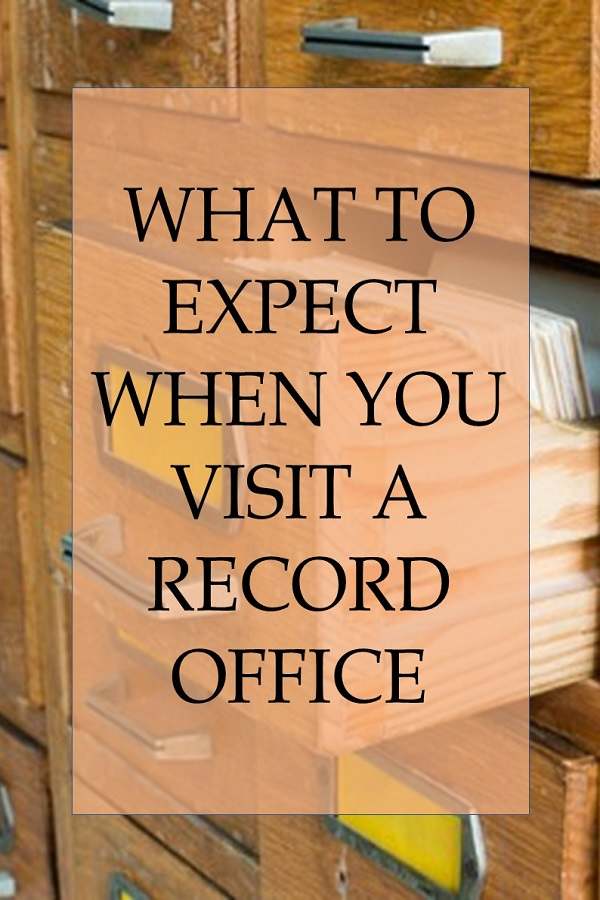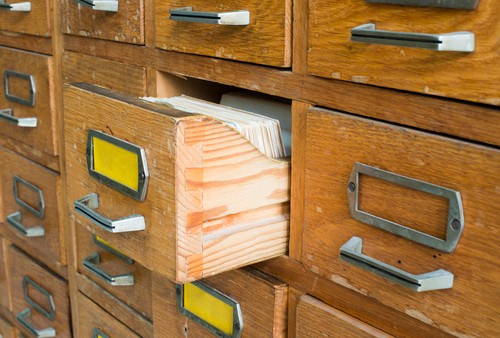
Record Offices bring together collections of items and documents local to the area served by the Archive. The Offices can also be known as County Record Offices. In larger cities, local authorities may administer their own city record office, such as Southampton City Archives or Portsmouth History Centre.
They have specialised staff who are very knowledgeable about the items in their care, and have helped to conserve the records for future generations to enjoy.
The records they hold can take you on a magical journey of discovery, and can make your ancestors really come to life, rather than just being names on a family tree. Seeing your ancestor’s signature on a document for the first time is always a thrill.
Once you have asked your relatives what they know about the family, and have gained as much information as possible from sources such as birth, marriage and death certificates, and sources you can find online, you will want to further your research by visiting a Record Office.
You are able to peruse many sources that will help you to discover more information about your ancestors because although many items and documents are now available online, many documents are still only available in an Archive.
A Record Office is the best place to double-check any information you may have discovered online, such as in an online tree. Online trees often contain incorrect information. For further information about how to try and prevent inaccuracies occurring in your family tree, please read my article: are family trees accurate?
Most Archives have a search-room which includes reference books, catalogues and indexes. They also have a strongroom where other records are kept, and a conservation room where repair work is undertaken.
This article will explain what resources are available in record offices, how to plan your visit, record office facilities, what you do when you arrive, and certain aspects of record office protocol.
A list of record offices by county is also on the page.
Resources Available in Record Offices
Resources held by an Archive can include:
- Census Returns
- Church Parish Registers
- Wills pre 1858 that have been proved in the Local Ecclesiastical Courts. Sometimes copies of PCC Wills can also be included in any index prepared by the Archive, if the deceased lived in the area.
- Criminal Records
- Punishment Records
- Directories
- Taxation Records
These records can come from a variety of sources, including businesses, churches, local organisations, private individuals, prominent families, schools and solicitors’ offices.
Records are on a wide range of medium, which include:
- Books
- Manuscripts
- Maps
- Newspapers
- Photographs
- Sound Recordings
- Videos
Transcripts of documents such as parish registers have also been compiled, along with an index of parish registers held.
Some census returns have also been transferred to microfilm.
Many local history books are also held by the Archive.
Documents Can Be Gifted to The Archive
If you have documents you would like to donate to a Record Office, it would love to hear from you. Documents can be donated to the Office or can be deposited by long-term loan.
Planning Your Visit To The Record Office
Trips to Archives should always be planned in advance. You are recommended to ring beforehand to check it is open on the day you intend to visit and also to book a table if this is required.
It is also wise to use their website to peruse their online catalogue, read their guides to sources held, and discover what family history resources they hold.
Record Offices are free to visit, but they do make a charge for services they offer such as circuit breakers, photocopying, print-outs, research services and photography permits.
You should take your notes with you, so you know the names and dates relating to the ancestors you are searching for, and the best way to do this is to use a family tree chart or computer software program.
Book Microfilm Reader Before Visiting a Record Office
Whether you have to book a microfilm or microfiche reader in advance varies from record office to record office, so you should always check you do not have to book a machine.
Some documents, such as parish registers, have become fragile over the years, being transferred on to microfiche to protect the original documents as much as possible.
Tell the Record Office If You Wish to Use a Laptop
If you wish to take a laptop with you it is worth mentioning this at the time of booking as some tables might not provide computer accessibility. Please bear in mind that most Offices require you to purchase a circuit breaker before plugging in any electrical equipment.
Order Documents Before Visiting a Record Office
It is best to order documents in advance, although you do have to tell them the date and approximate time of your proposed visit. Although they include the document in their index of collections, some materials can be held off-site, so advance notice has to be given.
If you are unable to order documents in advance because you are unsure of the date and time you wish to visit, Record Office staff recommend that you note down the catalogue reference numbers of the documents you wish to consult to save time when you arrive.
Take Identification With You To The Archive
Proof of identity is required to access the search room of a record office, which includes your name, address and signature. Acceptable documents usually include bank statements, debit or credit cards, passports, pension books, official letters, UK driving licences or utility bills.
If you have an Archives Card this ticket is still accepted as proof of identity by some Record Offices if it is still in date, but some offices no longer issue the cards, preferring to use their own schemes.
Facilities at the Record Office
Eating Facilities
Whilst some Record Offices have a cafe or restaurant, some do not. Most do, however, have an area that is set aside for visitors to eat and drink their own food. These areas include vending machines where you can purchase hot and cold drinks and some snacks.
Parking Facilities
Some record offices do not have car parks, so it is best to check what parking is available if going by car.
Most record offices do, however, provide a limited number of disabled parking spaces, but you are advised to tell the Record Office staff of your requirements when contacting them so that they know you are coming and can reserve one of the spaces for you, and make any necessary access arrangements.
Disabled Access
Not all Record Offices have disabled access, unfortunately, because some of the buildings are very old, and it is not possible to add this facility. It is prudent to call the office in advance of your visit to tell them you would like to come, so they can make any necessary access arrangements for you.
Cameras
You can usually use a camera in the Archive, but you have to purchase a photography permit and ask the staff’s permission before taking any photographs of documents.
Some documents are very fragile so you may not be allowed to take a photograph if doing so could damage the document concerned.
You also have to keep a record of any document you have photographed.
Photocopies of Documents
Some large documents, such as maps, cannot be photocopied because the sheer scale of the document would make this impossible.
You are not permitted to take a photocopy of a fragile document because doing so could cause it to become damaged.
A charge is made by the Office for people taking advantage of this service.
Computers
Many Record Offices provide free access to the internet, which includes free access to sites such as Ancestry and FindmyPast. Some record offices do not have many computers, however, and they are always very popular, so if you wish to use a computer during your visit you are advised to get to the Office as early as possible.
It is best to contact the Office to ensure that you do not have to book a computer in advance. Depending on the number of people who wish to use a computer, your time may be limited to an hour or two hours, so please take this into consideration especially if you have travelled a long distance.
Research Services
Some record offices are able to conduct research on your behalf if you are unable to visit personally, but they require you to fill in a form, which is usually available on their website. It must be borne in mind that the Record Office does make a charge to people taking advantage of this service.
Inside Record Offices
Signing In
When you arrive at the Archive, you must always sign in even though it may not be your first visit. This is to ensure the security of the books, documents and records.
Card Indexes

Many Record Offices have card indexes and catalogues that can be used to obtain access to the records held by the Archive.
These cards contain basic information about the record, and usually give details of the document reference number, which can then be used to consult the catalogues to obtain more details of the document concerned.
If required, this reference number can then be used to order the document for further scrutiny.
Ordering Documents
You are usually able to order documents from the strongroom for scrutiny in the search-room subject to the particular Archive’s regulations for use in order to protect the documents as much as possible as some are fragile and to ensure they are available for future generations.
Once you have ordered a document, you must hand over your Archives Card or other reader’s ticket when it is issued. Your ticket is returned to you when you return the document.
Documents are usually issued within approximately 20 minutes of your request, but you may have to wait for a longer time if the Office is busy.
Handling Documents
Documents should be handled with great care.
If the document you have requested is a large book, you should always use supports provided by the Office to ensure that its spine is not damaged.
If you are consulting a large document such as a map, you may find it hard to keep the document flat, especially if it has been folded, so weights will help you to view the document easily without having to touch it too much. A transparent protective sheet can also be placed over the document so that it can be consulted without it being damaged.
If you are consulting many documents in the same bundle, they must be kept in the order in which they were issued. If one document is contained within another, you must return it in the same order and condition. The order of the documents is crucial, and can be very important.
Photographs can be very delicate, so you must ensure that you only touch the edge of the photograph wherever possible, and wear gloves if they are provided because fingerprints, especially on a photograph, can cause catastrophic damage to the image.
You should never place any notepad or paper on top of a document whilst you are writing because the pressure of the pencil could damage the document. Any item of this nature should be placed on the table.
Use a Pencil To Make Notes
You should always use a pencil to take notes as most archivists require you to use this rather than a pen as using a pen could damage documents and/or books.
Food is Not Allowed in the Search-room
Food and drink are not allowed in the search-room under any circumstances because food and drink, including water, could cause direct damage to a document. Remains of food can attract insects and pests that could cause irreparable damage to the records.
Personal Belongings
Lockers are usually provided where you can place personal belongings such as laptop cases, bags, handbags and coats.
You can take research notes and laptops into the search-room, but these notes must be kept in a clear folder, or placed in a bag provided by the Office for the purpose, such as those provided by the British Library.
Silence is Important
To ensure that other researchers can study in peace, you are required to remain as silent as possible, and if you need to have a conversation with another person, you must avoid it being too long or talk too loudly. If you wish to make a telephone call, you should leave the search-room.
